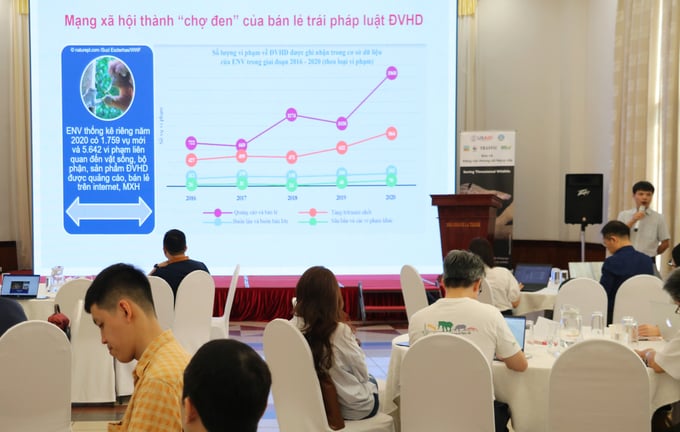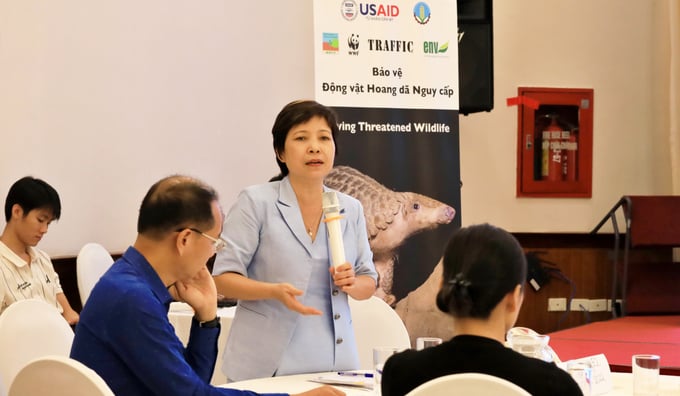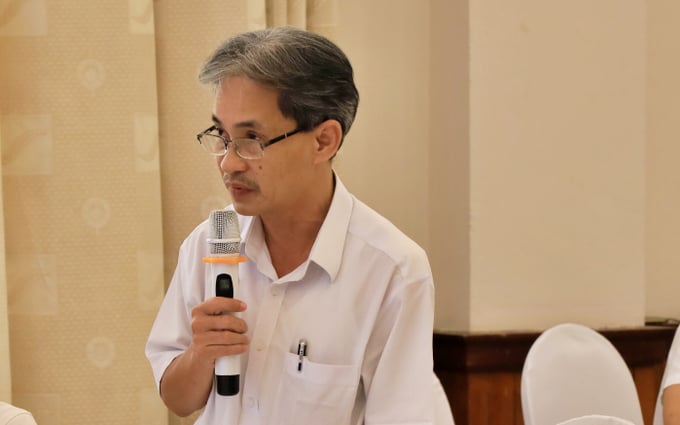May 16, 2025 | 20:24 GMT +7
May 16, 2025 | 20:24 GMT +7
Hotline: 0913.378.918
May 16, 2025 | 20:24 GMT +7
Hotline: 0913.378.918

Consultation meeting on the results of the report "Political, social, policy analysis and participation of parties in preventing and combating illegal wildlife trade and promoting legal trade in Vietnam". Photo: Phuong Thao.
Within the framework of The Saving Threatened Wildlife (STW) Project, The Management Board for Forestry Projects has just coordinated with relevant parties to organize a workshop to consult on the results of research on political, social, and policy analysis and the participation of stakeholders in preventing and combating illegal wildlife trafficking.
Delegates were also interested in promoting legal trade in wildlife in Vietnam.
At the meeting, four main goals were set. First, evaluate the current situation and trends of illegal wildlife trade in Vietnam. Build a database on the realities and actions of actors to address illegal wildlife trafficking.
Second, identify priorities to combat illegal wildlife trade and address gaps in achieving sustainable business in these commodities in Vietnam.
Third, the report recommends policy interventions and communications to strengthen political efforts against illegal wildlife trade.
Fourth, encourage changes to prevent and combat illegal wildlife trade and reduce the risk of the illicit trade in farms.
Mr. Nguyen Huu Nam, Deputy Director of VCCI Ho Chi Minh City, said that the report has provided a general picture of the law in combating illegal wildlife trade. He proposed that the project needs to identify a roadmap and specific results.

Mrs. Tran Thi Nam Ha, Deputy Director of the Central Saving Threatened Wildlife Project Management Board, spoke at the meeting. Photo: Phuong Thao.
Mr. Nguyen Manh Tien, Da Nang Forest Protection Department, suggested that the report focus on the investigation and consultation stage. He believes that when all of these contents are available, the information will ensure accuracy, logic, and consistency.
Recognizing the threat to species, both internationally and nationally, from wildlife trafficking, the U.S. Government is collaborating with the Government of Vietnam and civil society organizations to counter illegal wildlife trade in and through Vietnam.
The Saving Threatened Wildlife project supports the government of Vietnam to enhance leadership in combating the illegal wildlife trade by improving and harmonizing the legal system related to wildlife protection, strengthening law enforcement and prosecution of wildlife crimes, and reducing the demand and unlawful consumption of wildlife. The launch of the Saving Threatened Wildlife project marked the official notification by MARD of their support. It helped to raise awareness of the project aims among MARD departments, other Ministries, and the public through attendance, media attention, and communication, calling for collaboration among related parties in the coming phases of the project.
This project focuses onprotecting species that are at risk from international trafficking into Vietnam such as Africanrhinos, African and Asian elephants, and pangolins; as well as animals that are regularly poachedand traded domestically or internationally, such as primates, muntjacs, and big cats.
According to the 2023 work plan developed by The Saving Threatened Wildlife project, it includes three components. Component 1 aims to mobilize the participation and commitment of leaders at all levels and sectors, promote the private sector, and enhance the capacity of social organizations to solve the problem of illegal wildlife trafficking.

Mr. Nguyen Manh Tien, Da Nang City Forest Protection Department: The research report needs to focus on consultation and investigation. Photo: Phuong Thao.
Component 2 focuses on supporting capacity building for relevant parties in law enforcement against illegal wildlife trade. In the immediate future, we propose a plan to strengthen international cooperation with African countries in preventing and combating wildlife trafficking. At the same time, consider the risk of disease transmission from animals to humans at captive wildlife farms.
Component 3, the project strives to reduce the demand for illegal consumption of wild animals and products from this group.
Mrs. Tran Thi Nam Ha, Deputy Director of The Central Saving Threatened Wildlife Project Management Board, shared that the goal of the research report is to complete the action plan and, at the same time, provide necessary information to relevant parties before implementing the project in practice.
"The Saving Threatened Wildlife Project Management Board looks forward to comments from the agencies' perspectives, especially the reporting beneficiaries," Mrs. Ha said.
According to Mrs. Ha, the current draft report has relatively fully addressed political and legal issues. However, social and community factors have yet to be mentioned much. She also called on all parties to strengthen recommendations on inter-sectoral coordination in the implementation of the report.
Translated by Tuan Huy

(VAN) Cold-barn systems efficiently manage environmental and temperature conditions, which aids in the prevention of respiratory diseases in pigs and protects them from the vectors that transmit African swine fevers.

(VAN) To tackle challenges, the project 'Addressing key technical bottlenecks in the grouper supply chain in Vietnam' has been underway since 2024.

(VAN) The project 'Disease-Resilient and Sustainable Cassava Production Systems in the Mekong Region', funded by the Australian Center for International Agricultural Research (ACIAR), is being implemented from 2024 to 2028.

(VAN) Data from 10,000 farming households will help professionalize production organization and support the implementation of the One Million Hectares Program for High-Quality, Low-Emission Rice Cultivation.

(VAN) FAO Director-General QU Dongyu marks International Day of Plant Health at NENA conference.

(VAN) Deputy Minister of Agriculture and Environment Hoang Trung affirmed that floriculture and ornamental plants are a growing industry that receives significant global attention.

(VAN) The three staple crops dominating modern diets – corn, rice and wheat – are familiar to Americans. However, fourth place is held by a dark horse: cassava.